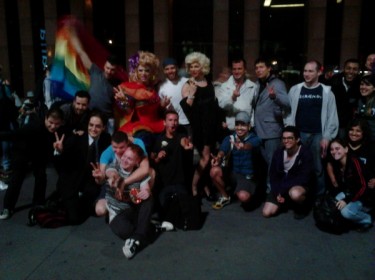On Thursday, Brazil's Supreme Court recognized civil unions for same-sex couples [pt]. In a unanimous decision, the justices stated that stable homosexual couples merit the same rights and obligations that Brazilian legislation grants to heterosexual couples. Individuals in homosexual unions can now benefit from their partner's pension, retirement and health plans, and homosexual couples can now enjoy all the benefits afforded under family law, such as adoption. According to the 2010 census, there are 60,000 gay couples in Brazil.

May 5, 2011 -> The day the Brazilian Supreme Court granted same-sex couples the right to form a civil union in a 10-0 vote. Twitpic by @Leo_Rossetti
The historic decision, which brings an end to the legal discrimination of homosexuals, dominated conversations both virtual and otherwise and assumed a predominantly commemorative tone. Since Thursday, when the session opened in the Court, the hashtag #uniaohomoafetiva (literally homo-affective union, Brazil's term to describe civil unions for same-sex couples) topped Twitter's trending topics.
Tielo, on the blog Ululos Selvagens (Wild Shrieks) [pt], watched the vote play out on television in order to analyze the arguments that would be used to recognize or deny civil unions for homosexuals. Proud of the country's Supreme Court (which hears only cases of constitutional concern), he highlighted the vote's best arguments:
Recomendo a leitura dos votos não apenas pelos argumentos jurídicos, mas pelos argumentos pró-tolerância.
Há duas falas que ministros que eu gostaria de deixar aqui:
“Aqui, o reino é da igualdade absoluta, pois não se pode alegar que os heteroafetivos perdem se os homoafetivos ganham. Quem ganha com a equiparação postulada pelos homoafetivos? Os homoafetivos, muito bem. E quem perde? Ninguém perde. Os heteroafetivos não perdem e a sociedade não perde” – Ministro Ayres Brito
“Uma sociedade decente é uma sociedade que não humilha seus integrantes.” – Ministra Hellen Gracie
I recommend a reading of the votes not only for the legal arguments, but for those arguments made in favor of tolerance.
There are two excerpts from the justices that I would like to include here:
“Here, the kingdom is one of absolute equality, since one cannot allege that hetero-affective couples lose if home-affective couples gain. Who gains from the equality that homo-affective individuals are seeking? Homo-effective individuals! And who loses? Nobody. Hetero-affective couples do not lose, and society does not lose.” – Justice Ayres Brito
“A decent society is one that does not humiliate its members.” – Justice Hellen Gracie
Papai Gay (Gay Daddy) [pt] says it was one of the rare moments in which he felt pride in Brazil's judicial system:
Essa equiparação nos faz, perante a lei, iguais em nossos direitos de casais gays. Isso tem um efeito psicológico social fortíssimo. O estranhamento que ainda causa quando as pessoas sabem que moro com um homem será amparado pela lei. Vão pensar 2 vezes antes de falarem que isso é uma pouca vergonha.
For Joaquim Fernandez, the decision came somewhat late on account of actions by religious groups and conservative social groups that have managed to delay legal recognition of civil unions for same-sex couples. Fernandez believes Brazil has made one more step in the right direction [pt]:
Só mesmo a visão turvada pelo preconceito ou pelo fanatismo religioso pode levar alguém a ser contra tal medida. A decisão, inclusive, não institui o casamento civil entre pessoas do mesmo sexo. Entendem os ministros que o casamento civil se restringe aos casais formados por um homem e uma mulher. Assim, não há motivos para alguém se opor a uma decisão que, reitere-se, foi tomada por unanimidade. Ainda que de forma mais lenta do que seria desejável, o Brasil vai avançando nas questões de cidadania.
This, however, was not the understanding shared by the many who celebrated the legal approval of civil unions for same-sex couples as if it were synonymous with marriage. Everton Lopes and Marcel Zama recount the overall mood on the streets of São Paulo [pt] following the ruling:
Ontem algumas dezenas de pessoas foram comemorar na Av. Paulista. Foi bem legal e interessante. Emocionante as pessoas gritando “Agora pode”, quando uma drag queen vestida de noiva apareceu segurando a bandeira do arco-íris.
Sim, agora pode!
Mas que fique bem claro. O mais importante não é casar. É TER O DIREITO DE SE CASAR. Direito negado desde sempre e que hoje, é a nossa realidade.
Yesterday, a few dozen people went to Paulista Avenue to celebrate. It was very cool and interesting. It was exciting to hear people shouting “now, it's allowed” when a drag queen dressed as a bride appeared waving a rainbow flag.
Yes, now it's allowed!
But, just for the record. What is important is not marriage. IT IS THE RIGHT TO MARRY. A right that has always been denied us is now our reality.
Actually, homosexual couples will not be able to marry under this ruling, which represents merely one step in the direction of civil unions for same-sex couples. Attorney Flavia Penido clarifies this and other questions [pt]:
Não se está falando sobre casamento gay, e sim de equiparação da união estável heterossexual para a união estável estabelecida entre homossexuais
Cida Lorenz Pelenz [pt] summaries the question regarding the guarantying of civil rights for all:
Elementar, meu caro. A Constituição já diz que somos todos iguais perante a lei. Cumpra-se a lei!
Dissonant voices
While the overall mood may be one of commemoration, not everyone is content with the Supreme Court's ruling. Jhunior Silva, for example, views the ruling as a setback for the family [pt]:
Deus neste dia está muito triste e decepcionado com os congressistas Brasileiros, o que Deus fez, eles querem apagar, abolir, tirar dos valores do ser humano o projeto família, mas eles não sabem, o que Deus estabeleceu homem nenhum irá destruir.
Congressional Representative Jair Bolsonaro mocks the court's ruling, saying “after gay civil unions, the next step is to legalize pedophilia.” Some people agree and have expressed similar points of view, such as Marcon [pt]:
Pelo andar da carruagem, muito em breve passará a ser necessário, no Brasil, que todo homem terá que ter uma experiencia homossexual para ser considerado maior de idade – felizmente de há muito já passei dos 18 anos e não serei alcançado por tal determinação.
The fight continues

Civil Union for Same-Sex Couples. Illustration by Marcel Trindade in homage of the ruling by Brazil's Supreme Court (Flickr, copyright CC BY 2.0)
Amanda Almeida underscores that the legal battle may have been won, but the fight continues [pt]:
Estamos agora em busca da aprovação do PL 122, que torna crime a ofensa e discriminação a homossexuais. É outro ponto que acho um absurdo que precise de votação. Respeito é algo que deveria ser inerente ao ser humano, independentemente de qualquer cor, raça ou escolha sexual. Mas tendo como estatística que um homossexual seja morto a cada um dia e meio (260 mortes irracionais em um ano), essa é outra luta essencial. Como infelizmente precisamos disso, que venha a votação da lei, mais uma vez.
Finalizo esse texto com uma frase fantástica da minha mãe. Sim, minha mãe. Que nunca foi feliz com minha ‘ orientação’ sexual e que sei que se sente triste com essa orientação, mas é uma pessoa que me deseja ver muito feliz, independente de qualquer coisa. Quando disse a ela que teve uma votação para garantir esses direitos, ela disse: “Mas se até as amantes, que obviamente causam destruições da instituição familiar, quando comprovam relacionamento duradouro têm direito a pensões e benefícios sem que nunca tenha sido necessária essa votação, pq um casal homossexual que só quer ser feliz sem prejudicar ninguém precisa passar por essa votação?” . Pois é, mãe. Ótima pergunta!
We are now looking to pass PL 122,which makes discrimination of homosexuals a crime. This is yet another point where I think it is absurd that we need a vote. Respect is something that should be inherent to human beings, regardless of color, race or sexual orientation. But, given the statistics that a homosexual is killed every 1.5 days, on average (260 irrational deaths annually), this is yet another essential fight. As we unfortunately need this, bring on the legal vote once again.
I end this text with the wonderful words of my mother. Yes, my mother. Who was never happy with my sexual “orientation” and who I know feels saddened by my orientation, but who is a person who wishes to see me very happy regardless. When I told her that there was a vote to guaranty these rights, she said: “But if mere lovers, who obviously bring destruction to the institution of family, when they can prove a lasting relationship have the right to pensions and benefits without there ever being a need to vote on the matter, why does a homosexual couple that only wants to be happy without jeopardizing anyone else need to be subject to a vote?” Exactly, Mom. Great question!
The manner in which Brazil is currently handling intolerance and prejudice will the the subject of the next post in this series. Read earlier articles in this series:
Brazil: Homophobia, Religion and Politics
Brazil: LGBT Scene Under Discussion







